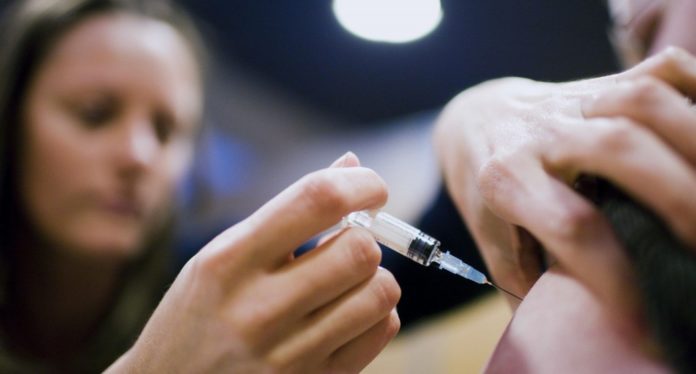
The leading U.S. pediatrician group on Friday urged parents, schools and communities to vaccinate children against measles in the face of an outbreak that began at Disneyland in California in December and has spread to more than 80 people in seven states and Mexico.
The American Academy of Pediatrics said all children should get the vaccine for measles, mumps and rubella between 12 and 15 months of age and again between 4 and 6 years old.
“A family vacation to an amusement park – or a trip to the grocery store, a football game or school – should not result in children becoming sickened by an almost 100 percent preventable disease,” Dr. Errol Alden, the group’s executive director, said in a statement.
“Vaccines are one of the most important ways parents can protect their children from very real diseases that exist in our world,” Dr. Alden said. “We are fortunate to have an incredibly effective tool that can prevent our children from suffering. That is so rare in medicine.”
The California Department of Public Health has reported 68 confirmed measles cases among state residents since December, most linked to an initial exposure at Disneyland or its adjacent Disney California Adventure Park.
Fourteen more cases linked to Disney parks have been reported out of state – five in Arizona, three in Utah, two in Washington state and one each in Oregon, Colorado, Nevada and Mexico. Almost all of those infected with the virus were not vaccinated against it.
The outbreak is believed to have begun when an infected person, likely from out of the country, visited the resort in Anaheim between Dec. 15 and Dec. 20. The health department said others with measles are known to have visited Disney parks in January while infectious but did not elaborate.
Among those infected are at least five Disney employees and a student from a local high school that has ordered its unvaccinated students to stay home until Jan. 29.
The outbreak has renewed debate over the mind-boggling anti-vaccination movement in which fears about potential side effects of vaccines, fueled by now-debunked theories suggesting a link to autism, have led some parents to refuse to allow their children to be inoculated.
The Los Angeles Times blasted the anti-vaccination movement in an editorial last week for what it called an “ignorant and self-absorbed rejection of science.”
“The prospect of a new measles epidemic is disturbing,” the editorial said. “So is the knowledge that many ill-informed people accept a thoroughly discredited and retracted study in the journal Lancet that purported to associate vaccination with autism.”
Measles, whose symptoms include rash and fever, was declared eliminated from the United States in 2000. But health officials say cases imported by travelers from overseas continue to infect unvaccinated U.S. residents. The sometimes deadly virus, which is airborne, can spread swiftly among unvaccinated children.
There is no specific treatment for measles and most people recover within a few weeks. But in poor and malnourished children and people with reduced immunity, measles can cause serious complications including blindness, encephalitis, severe diarrhea, ear infection and pneumonia.
Measles infections in the U.S. skyrocketed last year, with 610 cases reported — the highest number since the disease was eradicated on U.S. soil. The CDC says the increase is tied to a decline in child vaccinations.
